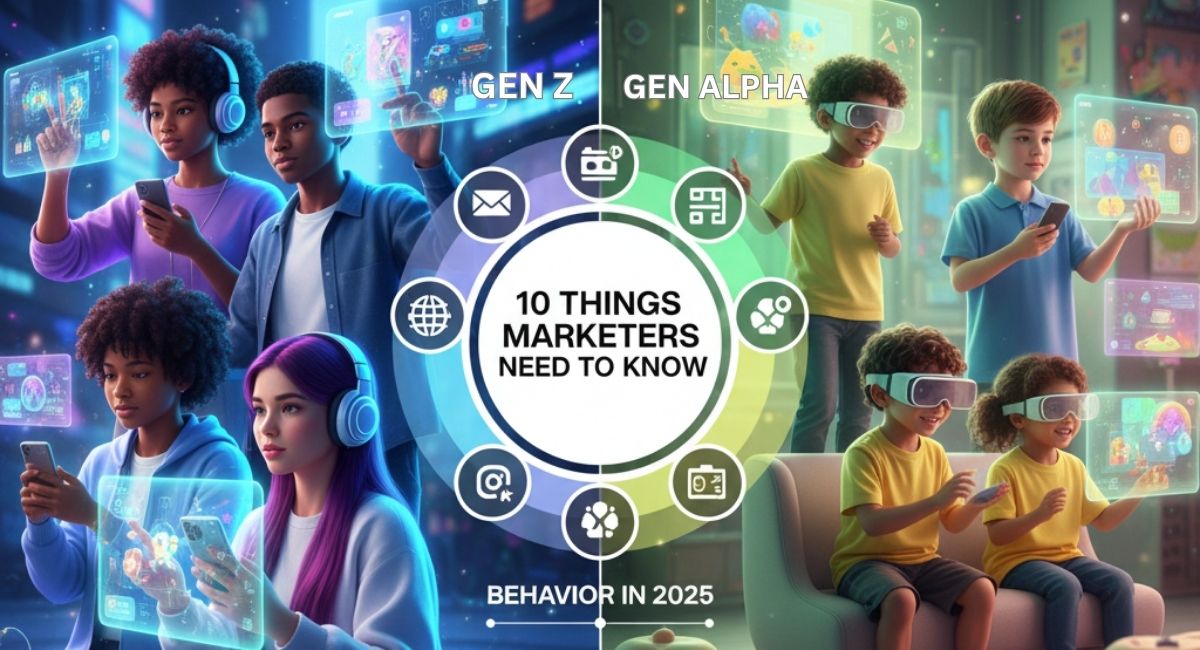Understanding the next wave of consumers means paying attention to how Gen Z and Gen Alpha interact with brands, content, and digital spaces. While millennials shaped the rise of social platforms and e-commerce, these younger audiences are rewriting the rules of engagement. Marketers looking to create sustainable strategies in 2025 and beyond must study the evolving preferences, consumption patterns, and values of these generations. Insights into their behavior can help businesses refine campaigns, improve product development, and build loyalty in highly competitive markets. For example, applying insights from Gen Z marketing trends 2025 alongside expertise from SEO marketing services can strengthen reach and engagement across multiple channels.
Why Gen Z and Gen Alpha Require a Fresh Perspective
Gen Z (born roughly between 1997–2012) and Gen Alpha (born after 2012) have grown up in highly digital environments. Their expectations for brands differ from older audiences. Instead of polished perfection, they prefer authenticity, transparency, and experiences that blend online and offline realities. For Gen Alpha in particular, being digital-first is not a shift but their baseline reality. Unlike millennials, who adapted to digital change, these groups live it.
The following ten insights form a manual guide for marketers aiming to reach these consumers effectively.
1. Short-form Video Is Their Language
Platforms like TikTok, Instagram Reels, and YouTube Shorts dominate their attention. Both generations respond to snackable, entertaining, and visually engaging content. Long-form text alone rarely holds attention, but storytelling that compresses information into quick moments resonates. Brands that want to connect should experiment with native video formats, behind-the-scenes clips, and interactive trends that encourage participation.
2. Community and Belonging Matter More Than Follower Counts
Gen Z and Gen Alpha value online communities over individual influencers with massive followings. Niche creators with smaller but highly engaged audiences often hold more sway. This means micro-influencer partnerships often outperform big-budget influencer campaigns. Building communities through platforms like Discord, Roblox, or even branded micro-communities allows companies to foster long-term loyalty.
3. Values Drive Purchasing Decisions
For these generations, consumer behavior goes beyond product features. They want brands that stand for something meaningful. Topics like climate change, inclusivity, and ethical production strongly influence decisions. Gen Z in particular expects companies to back their claims with action. Marketers who align campaigns with genuine values, rather than token gestures, earn higher trust and advocacy.
4. Gaming Is a Lifestyle, Not a Niche
Gaming has become a cultural hub for younger audiences. Gen Alpha spends more time in immersive environments like Fortnite or Minecraft than previous generations ever did. For them, gaming is both entertainment and social interaction. Marketers need to view gaming platforms as entry points for branding opportunities, partnerships, and digital product integrations rather than side experiments.
Comparative Overview of Gen Z and Gen Alpha Preferences
| Behavior/Preference | Gen Z | Gen Alpha |
| Content Style | Short-form, authentic, meme-driven | Interactive, gamified, immersive |
| Shopping Habits | Mobile-first, social commerce | In-app purchases, parental-influenced |
| Values | Sustainability, inclusivity | Fun, creativity, belonging |
| Tech Comfort | Adapted to digital | Born digital |
| Social Platforms | TikTok, Instagram, YouTube | Roblox, YouTube Kids, TikTok |
5. Social Commerce Is Becoming Their Default Storefront
Purchasing directly within platforms such as TikTok Shop or Instagram Checkout is becoming second nature. Social media is not just for discovery but for conversion. Younger shoppers trust peer reviews, unboxings, and authentic product demos over polished advertisements. Brands that combine engaging video with frictionless purchase paths will perform better in this evolving landscape.
6. Creativity and Participation Trump Passive Consumption
These audiences prefer to create, remix, and personalize content rather than only consume it. Filters, augmented reality tools, and custom digital avatars allow them to shape their identity online. Marketers should invite audiences into the creative process with user-generated content campaigns, interactive challenges, or personalized experiences.
7. Attention Spans Are Selective, Not Short
While it’s common to say these generations have shorter attention spans, the truth is they prioritize fast filtering. They quickly decide whether content is worth their time. If brands provide engaging, relevant, and interactive experiences, Gen Z and Gen Alpha are willing to stay for long-form content, including podcasts and streams. The challenge is to earn attention in the first three seconds.
8. Hybrid Identities Are Normal
Both generations blur the lines between online and offline worlds. An outfit for Roblox or Fortnite matters as much as one purchased from a store. The rise of digital collectibles, NFTs, and customizable avatars reflects their hybrid lifestyles. For marketers, this opens opportunities in both physical and digital product development.
9. They Prefer Peer-Led Discovery Over Ads
Instead of trusting traditional ads, these consumers rely heavily on peer recommendations, reviews, and shared experiences. Platforms like Reddit and Discord serve as important discovery points. For marketers, this means strategies like ad copywriting services should focus on conversational, authentic messaging that mirrors peer-driven discussions.
10. Education, Entertainment, and Shopping Are Merging
Learning platforms on TikTok, gamified education tools, and blended shopping experiences illustrate how these generations expect integration. They do not view entertainment, education, and commerce as separate. Brands that creatively combine these experiences capture attention more effectively. Interactive quizzes, edutainment videos, and gamified rewards systems are ways to meet these expectations.
Building Marketing Strategies Around Generational Behavior
The next step for businesses is to adapt campaigns to these behaviors. This includes rethinking how websites, apps, and content are structured. Leveraging modern tools such as custom web development ensures digital platforms can deliver immersive, interactive, and user-friendly experiences. Social strategies must combine entertainment with trust-building, while paid campaigns require authentic influencer partnerships rather than traditional one-way advertisements.
Actionable Marketing Tips for Younger Generations
- Collaborate with micro-influencers rather than relying on large celebrity endorsements.
- Design hybrid campaigns that include both digital and physical touchpoints.
- Offer personalization tools such as AR filters, quizzes, or gamified brand apps.
- Use blog writing services to build thought leadership while maintaining relatable and authentic tone.
- Optimize websites for speed and interaction since both Gen Z and Gen Alpha expect instant engagement.
FAQs on Marketing to Gen Z and Gen Alpha
What are the biggest differences between Gen Z and Gen Alpha in consumer behavior?
Gen Z values social issues and authenticity, while Gen Alpha prioritizes interactivity, gaming culture, and creativity. Gen Alpha is also more influenced by parental purchasing power compared to Gen Z.
How do Gen Z marketing trends in 2025 affect brand strategy?
They emphasize community-driven content, social commerce, and hybrid online-offline experiences. Brands need to focus on meaningful values and integrate shopping directly into platforms like TikTok.
What role does gaming play in marketing to Gen Alpha?
Gaming is central to their culture. It is where they socialize, create, and interact. Marketers can integrate branded experiences into platforms like Roblox or Fortnite to connect authentically.
Is influencer marketing still effective for Gen Z and Gen Alpha?
Yes, but smaller, more authentic creators outperform celebrity-style influencers. Trust and relatability are more persuasive than scale.
How can brands prepare for Gen Alpha’s future spending power?
Investing in digital-first strategies now, experimenting with immersive technologies, and aligning with family-friendly values positions brands for success as Gen Alpha gains purchasing independence.
Final Words
Reaching Gen Z and Gen Alpha requires moving beyond traditional campaigns. Their behaviors reflect a demand for authenticity, creativity, and meaningful community-driven interactions. Whether it’s embracing social commerce, integrating into gaming platforms, or developing hybrid products, brands must meet them where they are. With support from professional partners like Maxim Blu, companies can shape future-ready campaigns that resonate deeply with these generations.





